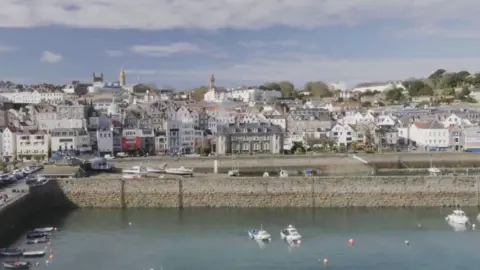Covid: Guernsey leaves second pandemic lockdown
 BBC
BBCGuernsey has removed the majority of its Covid-19 restrictions for the second time during the pandemic.
The island's first coronavirus lockdown lasted for 88 days between 24 March and 20 June 2020, with this second lockdown lasting 57 days.
Businesses in Guernsey and Herm can return to normal, with no social distancing or mask requirements.
However, all arrivals into the bailiwick are still required to self-isolate for at least two weeks.
Since the lockdown started on 23 January, 569 cases of the virus have been found in the islands and one person has died with the virus.
During the pandemic the islands have seen a total of 821 known cases and 14 Covid-related deaths.
'Protected health service'
The higher number of cases in the second lockdown has been put down to improved testing capability as well as the more virulent nature of the Kent variant detected in the island.
Peter Ferbrache, chairman of the Civil Contingencies Authority, described the move out of lockdown as a "huge achievement" and thanked islanders for sticking to lockdown rules.
He said: "We protected our health service, kept our vaccine programme moving forward and prevented a much higher loss of life."
With more than 29,000 doses of Covid-19 vaccines distributed, 44 doses per 100 people have been administered to Guernsey residents.

This means 30% of over-16s have had one dose, with 11% having received both.

On the High Street
By Euan Duncan, BBC Channel Islands News
Music played on Monday afternoon in St Peter Port as people walked through town with a spring in their step and a smile on their face.
Almost all chose not to wear face coverings, and groups of islanders gathered to catch up again after two months of lockdown restrictions.
Spring naturally provides some hope of better days to come and this optimism was a contagious feeling around others thinking similarly.
The freedoms now afforded to residents are not taken for granted or lightly, there is simply relief that better days are ahead of us all.

Deputy Ferbrache emphasised that while border restrictions will remain in place for a "little while longer", he said the success of the island's vaccination programme meant the island was "getting closer to that tipping point" where some travel could resume.
"We have good reason to be optimistic as we look forward," he added.
Sark and Alderney moved out of lockdown on 4 March and 9 March respectively and have lifted quarantine requirements on people coming from Guernsey.
Non-essential travel to the bailiwick has resumed, but arrivals are still obliged to self-isolate for two weeks and be tested on days one and 13 after arrival.
Anyone who declines to be tested must self isolate for 21 days.
Allow X content?
Social distancing and mask wearing requirements have been removed, but mask use is encouraged in shops and on public transport.
Anyone experiencing Covid-19 symptoms should stay at home and call the clinical helpline, the States emphasised.
Mask wearing will continue to be required at the Princess Elizabeth Hospital, which has resumed normal health services and visitation rules.
Bus services have returned to their full timetable, apart from additional summer services normally put on for tourists, and passenger capacity restrictions have been lifted.
Beau Sejour has started a phased return to reopening, but some facilities and activities will remain unavailable in the short term while the leisure centre is the site of the coronavirus vaccination centre.
Support organisations such as Guernsey Mind have said "Welcome back" on social media, inviting people to visit, with hygiene measures in place.
Parking restrictions in all monitored zones were also being reinstated, police tweeted.

Follow BBC Guernsey on Twitter and Facebook. Send your story ideas to channel.islands@bbc.co.uk.